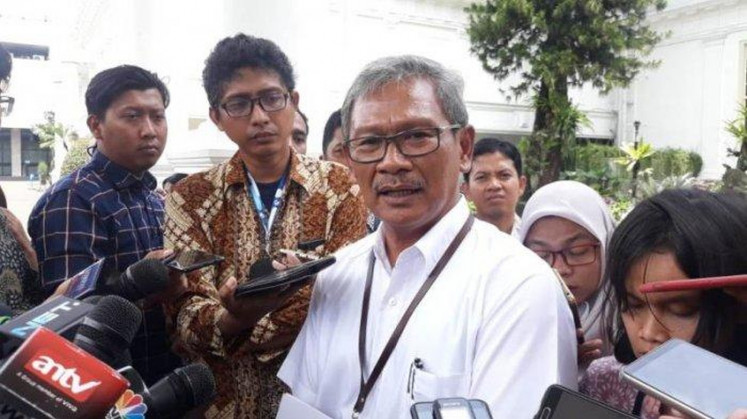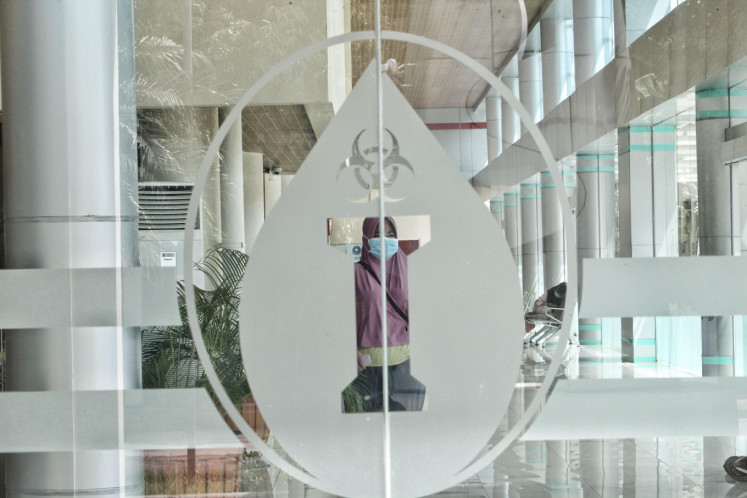Popular Reads
Top Results
Can't find what you're looking for?
View all search resultsPopular Reads
Top Results
Can't find what you're looking for?
View all search results[UPDATED] Explainer: How bad is the COVID-19 situation in Indonesia?
The country has recorded at least four COVID-19 cases within its borders as of Sunday.
Change text size
Gift Premium Articles
to Anyone
I
t goes without saying that Indonesia is not immune to the novel coronavirus that has infected more than 100,000 people in more than 60 countries around the world.
After weeks of claiming to have zero cases of the coronavirus disease 2019 (COVID-19), a claim that befuddled many and led to suspicion that the country is either unable to detect cases or covering them up, the country finally announced that citizens within its borders had also contracted the virus.
Below is what you need to know about the outbreak in the country.
Confirmed cases
The country has recorded at least 27 COVID-19 cases within its borders as of Wednesday.
Case 1 and Case 2 are a 31-year-old woman and her 64-year-old mother from Depok, West Java. The daughter is believed to have contracted the virus after visiting a Jakarta restaurant where she took part in a dance event that was also attended by an infected Japanese woman. The Japanese national, who was diagnosed with COVID-19 in Malaysia, traveled to Indonesia in January and February.
The country announced two more cases linked to the first two patients on Friday. Details about these new patients are still sketchy. The government has been extra cautious in providing information on the cases. One of the first two confirmed patients claimed to have suffered mentally after her private information had been disclosed by the authorities and later exposed by the mainstream media and Internet users.
Two more patients tested positive for the virus on Sunday. One, Case 5, is a 55-year-old man who is linked to Case 1, the Health Ministry said, while the other, Case 6, is a 36-year-old man who was among the Indonesian crew members of the virus-stricken Diamond Princess cruise ship that was docked in Yokohama, Japan.
The ministry announced 13 cases on Monday. It said two of the 13 new cases were foreign nationals, but did not specify which countries they were from.
Seven of the cases were also identified as imported cases, which means that the patients likely contracted the virus outside of Indonesia.
The government reported the first possible community transmission in the country on Tuesday, after a citizen with no link to certain confirmed cases or travel history to affected countries tested positive for the virus.
The 33-year-old man was Indonesia’s 27th confirmed COVID-19 patient, it said, adding that the patient did not have a clear link to the other confirmed COVID-19 patients in the country. Case 27 did not contract the virus abroad and his exposure to coronavirus was still vague.
At least 12 Indonesian nationals have been infected with SAR-Cov-2, the virus that causes COVID-19, overseas. One in Singapore and another in Taiwan have recovered from the disease. Nine others were infected while onboard the Diamond Princess cruise ship. Four of the nine crewmen have recovered, the ministry said.
Suspected patients
The Health Ministry defines suspected patients as those showing COVID-19 symptoms and having a travel history to countries affected by the outbreak. All suspected patients must take a throat swab test to confirm whether or not they have the virus.
Only recently did the government decide to test those having had contact with infected people even though they did not show symptoms.
The ministry said on March 5 that it had tested samples from 388 suspected patients, including 188 from the World Dream cruise ship. It is unclear, however, how many suspected patients are currently being treated in hospitals across the country.
As of now, five suspected COVID-19 patients have died, but the health authorities have said that they had been found to be negative of coronavirus. The five patients were treated in Semarang, Batam, Cianjur, Yogyakarta and Jakarta.
Who leads the fight against coronavirus in Indonesia?
Indonesia does not have an independent centers for disease control and prevention. The Health Ministry is now leading the management of the health crisis, with its secretary, Achmad Yurianto, being recently appointed as its sole spokesman.
Some experts, including those leading the fight against the bird flu outbreak between 2006 and 2010, have called for the creation of a special committee similar to the now-defunct National Commission for Avian Influenza to lead the battle against the virus. The ministry, however, insisted that such an agency was not needed.
The country once had a national committee for zoonosis tasked with handling virus outbreaks. It was disbanded by President Joko “Jokowi” Widodo in 2016.
Indonesia has appointed secretary Achmad Yurianto (center) of the Health Ministry's disease control and prevention directorate general as the spokesperson for coronavirus-related matters following the country's first confirmed cases of COVID-19. (Tribunnews.com/Fransiskus Adhiyuda)How does Indonesia test suspected patients?
The government claimed to have used a polymerase chain reaction (PCR) and a gene sequencing analysis to test specimens from suspected patients as per WHO standards.
The Health Ministry’s Balitbangkes was once the sole agency tasked with conducting tests. The ministry then decided to assign its laboratories in 10 regions to perform the PCR testing too after reporting the first two cases.The cities are Batam, Medan, Palembang, Makassar, Manado, Ambon, Jakarta, Yogyakarta, Surabaya and Banjarmasin.
Denpasar, the capital of Bali, is not on the list despite being a major tourism hotspot and one that had direct flights to and from Wuhan, the epicenter of the virus outbreak.
Why has Indonesia only recorded few cases?
Some scientists believe that the government might have under-reported cases, saying that, given the large number of visitors not only from China but also from other affected countries, it is hard to believe that Indonesia only had four cases. They have called on the government to be more transparent in the handling of the outbreak by involving more scientists in its work.
Critics, including foreign governments, have questioned why Indonesia, which has a population of more than 250 million, has only conducted a small number of tests. South Korea, by comparison, has tested more than 100,000 samples. The Indonesian government, however, argued it followed WHO recommendations.
The number of confirmed cases rose to 19 on Monday after health officials had begun tracing and testing those with no travel history to China and other affected countries but having had contact with infected people in Indonesia.
Some scientists have argued that the tropical climate has made the virus less virulent and slowed down its spread, but that has not been proven yet. It is true, though, that the transmission of influenza is dependent on humidity and temperature.
Other Southeast Asian countries have reported far more cases than Indonesia, but the numbers are still lower than those reported in South Korea, Iran and Italy. As of Sunday, Singapore has had 138 cases (90 have recovered), Malaysia 93 (25 have recovered) and Vietnam 18 (16 have recovered) and the Philippines 6.
What has the government done to contain the virus?
The government has imposed a travel ban on people from mainland China and people from coronavirus-hit regions of Iran, South Korea and Italy.
It has finally released its official protocols for dealing with the COVID-19 coronavirus. Members of the public are expected to follow the protocols if they find they are experiencing COVID-19 symptoms.
“If you are experiencing one of the COVID-19 symptoms, such as a 38-degree Celsius fever, please rest. Drink a lot of water,” Health Ministry secretary-general Oscar Primadi said on Friday.
According to Oscar, the protocols are meant to guide the actions of people when they gather in public places. The protocols deal with educational areas, public areas, public transportation, health access, first aid and identifying the infection.
The government will also build a special hospital for COVID-19 patients at a former Vietnamese refugee camp in Galang, Riau Islands.
Hospital staff and visitors wear masks at the Sulianti Saroso Infectious Diseases Hospital's isolation building in Jakarta on March 2. (JP/Seto Wardhana)Does Indonesia have adequate healthcare infrastructure to handle mass contagion?
President Jokowi said the government was well-prepared to handle COVID-19.
“We have prepared more than 100 hospitals with isolation rooms with good isolation standards. We also have equipment that meets international standards,” he said.
A WHO official also claimed on jan. 29 that Indonesia was well prepared to anticipate a coronavirus outbreak.
Authorities have implemented preventative measures to defend against the epidemic at 135 points of entry to the archipelago, including at airports, seaports and border areas, such as installing thermal scanners and medical check-up posts to examine suspected carriers of the virus, a representative of the Geneva-based United Nations agency acknowledged.
“Indonesia has a functioning early warning system and 100 hospitals in various locations that serve as referral [centers] and can handle cases with proper measures as well as effective infection prevention, " WHO representative for Indonesia, Navaratnasamy Paranietharan, said as quoted by Antara.
Indonesia has prepared eight hospitals to treat coronavirus-positive patients: Sulianti Saroso Infectious Diseases Hospital (RSPI) in North Jakarta, Persahabatan Hospital in East Jakarta, Gatot Subroto Army Hospital (RSPAD) in Central Jakarta, Pasar Minggu General Hospital (RSUD) in South Jakarta, Cengkareng General Hospital (RSUD) in West Jakarta, Mintohardjo Navy Hospital in Central Jakarta, Bhayangkara Police Hospital in East Jakarta and Fatmawati Hospital in South Jakarta.
Regional administrations have also prepared for the outbreak.
Editor's note:
The article was updated on Wednesday, March 11, 2020, at 12:45 a.m.












